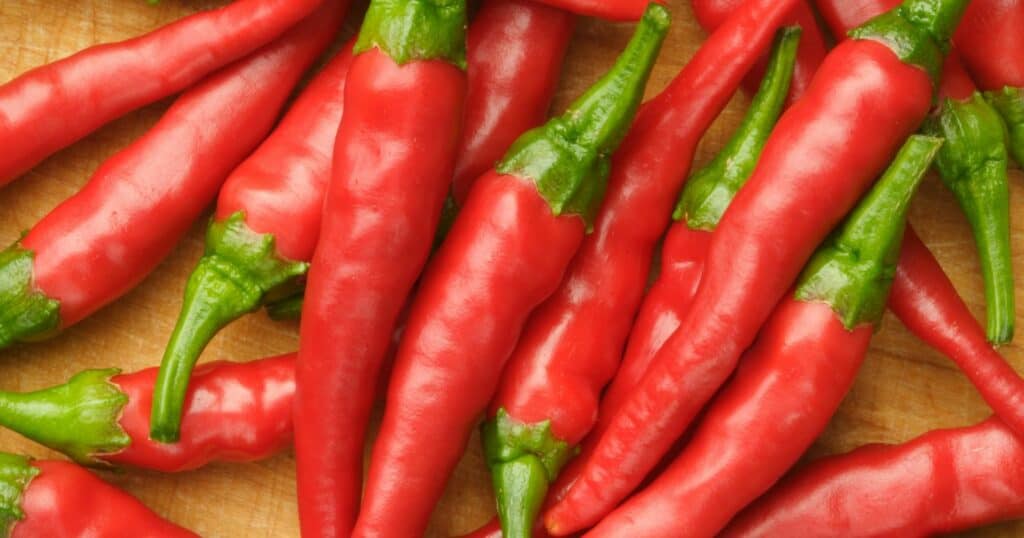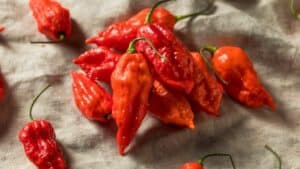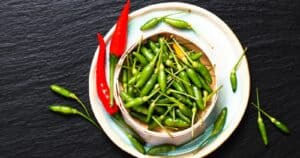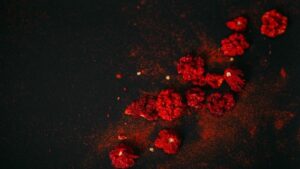As a bird watching enthusiast, you may love seeing your backyard feeder flocked with colorful feathered friends. But you may hesitate to add cayenne pepper to deter pesky squirrels, wondering if the
The good news is cayenne pepper does not directly hurt birds or cause adverse health effects if they ingest it. However, some care should be taken when using cayenne pepper around sensitive bird species.
Read on to learn more about cayenne pepper’s safety for birds, including:
- Why birds can tolerate spicy cayenne pepper
- Potential precautions to take around birds
- How to incorporate cayenne to deter squirrels
- Signs cayenne may not suit your particular birds
- Alternative squirrel deterrents for bird lovers
Cayenne pepper gets its kick from capsaicin. But remarkably, birds lack receptors to detect the heat from this compound. So they experience no spicy sensation from consuming cayenne-coated seeds. While safe for birds, some best practices are recommended when using cayenne pepper around them.
Here’s a quick overview of cayenne pepper’s effects on birds:
- Cayenne does not hurt birds or impact their health if ingested
- Birds cannot taste the heat due to lacking necessary receptors
- Some birds even enjoy spicy flavors and seek out hot peppers!
- Precautions should be taken to avoid eye irritation from loose residue
By understanding proper usage tips, bird lovers can harness cayenne’s squirrel-deterring properties without risking the wellbeing of backyard bird visitors.
Why Birds Are Immune to Cayenne’s Heat
Cayenne pepper gets its kick from a compound called capsaicin. But remarkably, birds have a natural immunity to the burning effects of capsaicin. Here’s why:
- Birds lack the receptors that detect capsaicin. So they do not experience any spicy sensation from consuming cayenne.
- Their taste buds are also not irritated by capsaicin, so cayenne tastes no different than any other seed to birds.
- Some birds even enjoy the flavor of hot peppers and seek them out!
- Bottom line: birds are completely unaffected by the heat of cayenne pepper.
This immunity means birds can feast away on spiced up birdseed while scaring squirrels off. But it’s still smart to take precautions when using cayenne pepper around our feathered friends.
Potential Precautions When Using Cayenne for Birds

While cayenne pepper does not hurt birds if ingested, some care should still be taken when using it around them:
- Cayenne residue on birdseed can blow into eyes and cause irritation if it’s windy.
- Heavy concentrations of loose cayenne could overwhelm and deter even immune birds.
- Consider precautions if you have bird species sensitive to strong scents.
- Monitor birds for any signs of distress after introducing cayenne.
- Do not allow cayenne pepper to accumulate in feeders.
With some thoughtful precautions, we can use cayenne to safely deter squirrels without negatively impacting the birds we aim to feed and enjoy.
Dealing With Pesky Squirrels Raiding Your Bird Buffet
Squirrels just can’t resist crashing the bird feeders and stealing all the seed. But sprinkling on some cayenne pepper can help reroute those furry freeloaders. Here’s how:
- Cayenne pepper’s spicy heat overwhelms squirrels’ sensitive taste buds.
- The potent scent also acts as a strong deterrent to squirrels’ keen noses.
- Sprinkling cayenne pepper flakes on birdseed makes it unappetizing to squirrels.
- Dousing problem areas with a cayenne pepper repellent spray can also discourage squirrels.
Thanks to cayenne’s unpleasant effects on squirrels but immunity in birds, it’s an excellent solution for protecting your birdseed reserves.
Safely Incorporating Cayenne Pepper in Bird Feeders
Follow these tips for safely adding a touch of cayenne pepper to your bird feeding routine:
- Start with small amounts – 1 teaspoon of cayenne pepper per 1 pound of birdseed.
- Mix the cayenne pepper thoroughly into the birdseed to distribute evenly.
- Monitor birds closely for 1-2 weeks to ensure no adverse reactions.
- Remove any accumulated residue in feeders promptly to prevent eye irritation.
- Store birdseed containers away from wind, rain, and humidity to prevent caking.
- Refill feeders frequently to prevent buildup of concentrated cayenne residue.
With careful application and monitoring, cayenne pepper can be a safe squirrel deterrent for your bird buffet.
Signs Cayenne Pepper May Not be Safe for Your Birds
While cayenne doesn’t hurt most birds, look for these signs that your specific feathered friends may not tolerate it well:
- Avoiding feeders after cayenne is introduced
- Visible irritation around eyes or beaks
- Sneezing, coughing, or shaking head excessively
- Lethargy, lack of appetite, or trouble swallowing
- Discomfort behaviors like fluffed up feathers or wheezing
If you observe any of these reactions in your backyard birds after adding cayenne pepper, remove it right away and offer plain birdseed.
Alternative Squirrel Deterrents for Bird Lovers
If cayenne pepper seems too risky, even in small amounts, there are other creative ways to foil those seed snatching squirrels:
- Install smooth plastic baffles on poles and hang feeders from a wire to block climbing.
- Apply non-toxic chili powder or ground black pepper to repel through scent.
- Use weight sensitive perches that close access to the seed when squirrels climb on.
- Try a feeder with “squirrel proof” metal cage or plastic dome design.
- Set up a separate squirrel feeding station away from main bird feeders.
With some strategic planning, you can outsmart those furry thieves and protect your bird buffet using squirrel-safe methods.
Creating an Enjoyable Bird Feeding Experience
Follow these tips to create a relaxing, rewarding bird feeding experience:
Location:
- Pick a quiet spot away from high traffic areas so birds feel calm and safe.
- Ensure good visibility so you can watch birds comfortably.
- Avoid locations near windows or predators.
Feeders:
- Select feeder designs suited for species you want to attract.
- Platform feeders are great for larger birds like cardinals and jays.
- Tube feeders appeal to smaller birds like finches and chickadees.
Food:
- Black oil sunflower seeds attract the widest range of birds.
- Offer suet, nuts, fruits, and nectar for more diversity.
- Consider seasonal needs – fruit in summer, suet in winter.
Maintenance:
- Keep feeders clean to prevent disease – disinfect monthly.
- Use bird safe cleaning methods – 1 part bleach to 9 parts water.
- Refill when empty and remove old food and droppings.
Follow these tips to create an engaging birdwatching experience for you and a healthy, appealing environment for your wild visitors.
The Takeaway: Cayenne Pepper and Birds Can Safely Mix
Here’s the key point to remember: While cayenne pepper does not harm birds, take care when using it around them. Apply sparingly, monitor for reactions, and remove any accumulated residue promptly. With prudence, bird lovers can harness cayenne pepper’s squirrel-deterring powers without putting our beloved feathered friends at risk. A little planning goes a long way in creating a safe, peaceful bird feeding experience for all.





